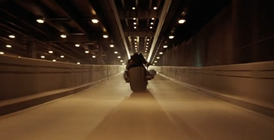Great Community Managers Are Like Batman at The End of “The Dark Knight”
 “Because he’s the hero Gotham deserves, but not the one it needs right now. So, we’ll hunt him, because he can take it. Because he’s not our hero. He’s a silent guardian. A watchful protector. A dark knight.”
“Because he’s the hero Gotham deserves, but not the one it needs right now. So, we’ll hunt him, because he can take it. Because he’s not our hero. He’s a silent guardian. A watchful protector. A dark knight.”
This statement concludes “The Dark Knight,” the 2008 Batman movie directed by Christopher Nolan. It is uttered by Commissioner James Gordon, portrayed by actor Gary Oldman. I watched the film last night and, as I often do with things that I see and hear, pondered how it might apply to community managers.
When Gordon makes that statement, he’s speaking to his son, who Batman had just saved from Two-Face, the evil alter ego of Harvey Dent, the former district attorney who the public views as Gotham’s “white knight.” After the younger Gordon is saved, Batman and Gordon briefly discuss the fall of Dent and how it means that the Joker – the film’s primary villain – has won because he corrupted and made evil the seemingly incorruptible Dent.
At that point, Batman makes a choice. He will allow the public to believe that the people killed by Two-Face were really killed by him. The public will never learn of Dent’s fall from grace or the murders he committed. They will, instead, look at him as a hero, as someone who died protecting them. Because they will never know what happened to Dent, the Joker will not win.
The consequence being that Batman will now be hunted, more than ever before. Even those who believed he was good for the city will now regard him as a villain, even though he isn’t. Gordon urges him not to do this, but Batman quickly decides. Gordon’s son sees Batman running and asks why, saying that he hasn’t done anything wrong. And then Gordon delivers the film’s final lines.
So, we’ll hunt him, because he can take it.
This might be the most important sentence in that statement. Batman opts to step into the line of fire, rather than tell the public the truth about Dent and allow the Joker to make his point. Most people would not be able to weather the consequences of that choice. But, Batman can. He can take it and that is why it is OK.
Similarly, the best community managers know of the importance of taking criticism away from others – like their staff – and focusing it on themselves. When you have to ban someone or remove some piece of content, and people are unhappy with that, you can’t tell everyone everything. You can’t tell them all of what that person did, because it wouldn’t be professional. A desperate person will say anything to make people believe them. You can’t sink to their level and, no matter what you say, some people will always believe a liar. They’ll treat you like the villain in the situation, no matter how fair or unfair that is.
That isn’t something that everyone is built to handle. But, if you want to be great at this, you must be able to take it.
Because he’s not our hero. He’s a silent guardian. A watchful protector.
Community manager is not a glamorous role. When Gordon speaks of “our hero,” I think that the inclusion of “our” is interesting because it speaks to choice. We all choose our heroes and when we make these choices, we generally decide based upon acts that we know they have done. Most of the acts of a community manager will never be known to most members. It is in with the help of those acts that the community strengthens. Yet, many will think that a successful community is something that happened on it’s own or, at least, did not happen due to the community manager, simply due to the members of the community.
In this way, a community manager is a silent guardian and a watchful protector, navigating challenge after challenge. Spam? Personal attacks? Inappropriate content? Worse? They pop in, remove it and it is like it never happened. Most people who visit will never be the wiser.
A community manager must look at the things not everyone wants to look at and deal with the people not everyone wants to deal with. They must make sound, consistent decisions and do so privately and quietly. Not because it will be the popular thing to do, because it often is not. Not because they will be praised, because they often are not. And certainly not because it is easy, because it often is not. They must do it only because they know it is the right thing to do for the community, in darkness or in light.
